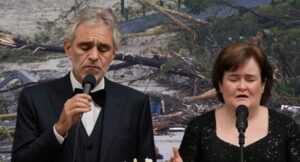As Devastating News of the Texas Floods Swept the Globe on the Evening of July 11, Susan Boyle Got a Call From Andrea Bocelli. He Whispered Softly, as Only One Who Has Experienced Intense Grief Can: “Presence Is More Important Than a Flawless Song. A Song That Can Support Individuals Through Their Loss Is What We Need. They Were at a Little Florence Studio the Following Morning. No Producers. No Thoughts of Charts. Just a Piano, a Violin, and Two Voices Shaped by Life — Its Sadness, Its Wonder, Its Quiet Beauty.

Light Beyond the Water: How Susan Boyle and Andrea Bocelli Gave Grief a Voice After the Texas Floods
On the night of July 6, 2025, the world watched in horror as Texas faced one of the deadliest flood disasters in recent history. Towns submerged, families displaced, and over a hundred lives — including dozens of children — lost beneath merciless waters. But while television anchors reported from rooftops and emergency crews searched through debris, two voices thousands of miles away quietly began to craft something the news could not offer: a balm for the brokenhearted.
In her modest cottage in West Lothian, Susan Boyle sat in silence. The names of lost children scrolled across her screen, each one catching in her throat like a prayer unspoken. Then the phone rang.
It was Andrea Bocelli.
His voice, steady but grief-stricken, said only:
“Susan… we don’t need a hit song. We need a healing one.”
Susan’s answer was instant and unshaken:
“I’m with you.”
A Song Born of Silence and Soul
By sunrise on July 7, Susan was in Florence. The setting wasn’t a grand studio or glossy stage, but a centuries-old chapel tucked into the Tuscan hills — converted into a sacred recording space. There were no producers or sound engineers. Just a grand piano, a single violinist, and two artists guided by something greater than fame.
Andrea played a soft chord.
“We’ll call it ‘Light Beyond the Water,’” he murmured.
Susan, her voice barely above a whisper, replied,
“It sounds like hope.”
The lyrics came as if carried by the wind:
“Where the river stole the morning light,
We’ll sing your names into the night.
Through every tear the earth still keeps,
Love will rise where sorrow sleeps…”
They recorded it live, no retakes. No headphones. Just the unfiltered sound of grief, remembrance, and something close to grace. Susan’s voice trembled like a lullaby from a mother who had lost everything. Andrea’s notes rose like a hymn from the soul of the earth. And when Susan broke down on the final verse, Andrea didn’t cut the session.
He walked to her, placed a gentle hand on her shoulder, and said:
“That’s what they’ll feel — the truth in your breaking.”
Released Without Names. Felt Around the World.
Two days later, without press, fanfare, or announcement, the song was uploaded anonymously. The video was dim, lit only by candles. Just two people standing in a chapel, singing to ghosts.
It ended simply:
“In Memory of the Texas Flood Victims – July 2025”
That was all.
But the world listened.
Hospitals played it in flooded corridors. Families held it on loop as they sifted through memories and mud. One grieving mother wrote:
“I lost both my babies. I didn’t think I’d breathe again. But tonight, I listened. And I wept. And I knew I wasn’t alone.”
“It Wasn’t a Song. It Was a Shelter.”
Social media lit up not with excitement, but with reverence.
“Whoever made this gave grief a voice,” one user posted.
“This isn’t music. It’s a hand reaching through the dark,” said another.
Within 48 hours, the song had been shared over 3 million times. Still, no one knew who had sung it.
Only later did the names quietly surface. And when people learned it was Susan Boyle and Andrea Bocelli, they didn’t gasp — they nodded.
Because it made sense. Two voices long known for soul and sincerity. Not seeking spotlight, but simply offering solace.
Why They Hid Their Names
When a journalist finally asked Andrea why they released it anonymously, his answer was simple:
“Because it was never about us. It was about love — the kind that survives the flood.”
And Susan, her voice soft but sure, added:
“Sometimes the most powerful thing we can do… is sing for someone who can no longer sing.”
A Moment That Stood Still
“Light Beyond the Water” didn’t top charts. It didn’t trend for attention. It healed.
For once, the world didn’t move on too fast. It sat with the grief. It listened. It remembered.
And in that quiet, candlelit chapel — in the heart of Italy, for the hearts lost in Texas — two artists proved that music, at its most sacred, can be more than sound.
It can be shelter.
It can be prayer.
It can be light.


